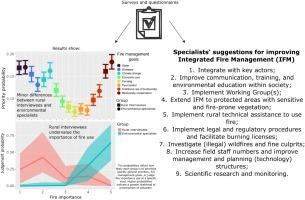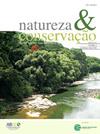Prioritizing fire management goals in a biodiversity hotspot
IF 3.5
2区 环境科学与生态学
Q1 BIODIVERSITY CONSERVATION
引用次数: 0
Abstract
Understanding the priorities and motivations of key actors is essential to setting fire management goals toward sustainability and resilience in a changing world. To investigate how key actors in fire management, rural residents and environmental specialists, prioritize fire management goals and assess their attitudes regarding fire use, fire regime effects, and Integrated Fire Management (IFM) in the Brazilian Cerrado savannas, we used an Analytic Hierarchy Process framework and Bayesian multilevel models. We identified minor differences in prioritizing fire management goals between rural interviewees and environmental specialists. Both groups independently regarded (1) pest control and farming as the lowest priorities and (2) protecting water resources and biodiversity conservation as the most important compared to other fire management goals. Despite the similarities, participants with higher education prioritized conserving biodiversity and its traditional use while emphasizing the importance of controlled fire use. Most specialists approved the use of IFM in protected areas (91.84%) and private areas (79.59%). Specialists also suggested improvements to IFM regarding mobilization and education, laws and regulations, surveillance, fund-raising, and scientific research. Our findings show that we should expect minor tradeoffs between key actors and their fire management goals, revealing a fruitful path for implementing a large-scale IFM in Cerrado that is aligned with the needs of local communities and avoiding conflicts.

优先考虑生物多样性热点地区的火灾管理目标
了解关键参与者的优先事项和动机对于在不断变化的世界中设定可持续和弹性的火灾管理目标至关重要。为了调查火灾管理的关键参与者、农村居民和环境专家如何优先考虑火灾管理目标,并评估他们对巴西塞拉多稀树草原火灾使用、火灾制度影响和综合火灾管理(IFM)的态度,我们使用了层次分析法框架和贝叶斯多层模型。我们确定了农村受访者和环境专家在优先考虑火灾管理目标方面的细微差异。两组人都独立地认为(1)害虫控制和农业是最不重要的,(2)与其他火灾管理目标相比,保护水资源和生物多样性是最重要的。尽管有相似之处,受过高等教育的参与者优先考虑保护生物多样性及其传统用途,同时强调控制使用火的重要性。大多数专家同意在保护区(91.84%)和私人地区(79.59%)使用IFM。专家们还建议国际货币基金组织在动员和教育、法律法规、监督、筹资和科学研究等方面进行改进。我们的研究结果表明,我们应该期待关键参与者及其火灾管理目标之间的微小权衡,为在塞拉多实施符合当地社区需求并避免冲突的大规模IFM提供了一条富有成效的道路。
本文章由计算机程序翻译,如有差异,请以英文原文为准。
求助全文
约1分钟内获得全文
求助全文
来源期刊

Perspectives in Ecology and Conservation
Environmental Science-Nature and Landscape Conservation
CiteScore
7.80
自引率
4.30%
发文量
46
审稿时长
59 days
期刊介绍:
Perspectives in Ecology and Conservation (PECON) is a scientific journal devoted to improving theoretical and conceptual aspects of conservation science. It has the main purpose of communicating new research and advances to different actors of society, including researchers, conservationists, practitioners, and policymakers. Perspectives in Ecology and Conservation publishes original papers on biodiversity conservation and restoration, on the main drivers affecting native ecosystems, and on nature’s benefits to people and human wellbeing. This scope includes studies on biodiversity patterns, the effects of habitat loss, fragmentation, biological invasion and climate change on biodiversity, conservation genetics, spatial conservation planning, ecosystem management, ecosystem services, sustainability and resilience of socio-ecological systems, conservation policy, among others.
 求助内容:
求助内容: 应助结果提醒方式:
应助结果提醒方式:


